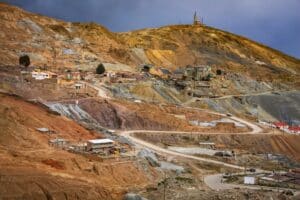In a world increasingly characterized by economic uncertainty, many people are contemplating a strategic move—relocating to places that offer a better chance of weathering financial storms. Where you live can significantly influence your ability to endure and bounce back from the effects of an economic collapse.
Some areas provide better opportunities for survival and recovery, making them ideal havens during economic turmoil. So, whether you’re looking to safeguard your family or simply exploring contingency plans, knowing the best places to relocate can be handy when you’re in a pinch.
Criteria For Choosing The Best Location For Strategic Relocation
Relocating, especially with the strategic objective of riding out economic turbulence, is a decision that requires careful thought and planning. While the ‘best’ location will vary based on individual circumstances, knowing what to look for when reviewing options can help make your decision easier.
Economic And Political Stability
Regions with economically diversified foundations are often more resilient to financial crises, making them a safer choice in an economic collapse. Steady growth, low unemployment rates, and controlled inflation characterize stable economies. They’re less vulnerable to sudden downturns and recover more quickly from economic shocks.
Regions that rely heavily on a single industry, whether manufacturing, tourism, or oil, can be hit hard when that industry experiences a downturn. On the other hand, regions encompassing various industries, such as technology, health care, agriculture, and education, are more resilient. When one industry declines, the impact is cushioned by the strength of other sectors.
Availability Of Resources
Places with fertile land suitable for agriculture offer the opportunity to grow your own food, reducing dependence on external food supply chains that can be disrupted during economic upheaval. Whether it’s a small vegetable garden or a larger farm, the ability to produce your own food can be a great benefit.
Wood and other natural resources can also be invaluable during economic downturns. Wood can be used for heating, cooking, and building, making locations with accessible woodlands especially advantageous. Other natural resources such as stone for building, clay for pottery, or minerals for various purposes can also come in handy.
Community Resilience
Communities with a culture of collaboration, mutual support, and resource sharing often contribute to a faster economic recovery. This resilience is usually due to a strong social fabric in which members support each other during difficult times. Look for communities that have successfully navigated crises in the past, as they’re more likely to navigate future economic upheaval successfully.
Resource sharing can take many forms, from shared gardens and lending libraries for tools to community-owned renewable energy systems. Such practices promote community cohesion and ensure everyone has access to the resources they need, regardless of personal wealth. This spirit of mutual aid can be a beacon of hope and stability during economic turmoil.
Access To Healthcare And Education
Moving to a region with a solid healthcare infrastructure will ensure you can work around potential issues with your current healthcare system. Moving to a location with a robust healthcare infrastructure ensures you can access quality healthcare services in times of need.
Additionally, a region with a well-established education system is equally important, particularly if children are involved. In uncertain times, ensuring continued learning and development opportunities for children can provide stability and security for families. Quality schools and educational institutions offer peace of mind and ensure that children’s education and growth don’t suffer despite the economic challenges that may arise.
Climate And Natural Environment
Selecting the ideal site requires informed decision-making, including evaluating potential environmental hazards and their impact on your chosen area. It’s important to consider natural disasters such as hurricanes and floods to ensure safety.
In today’s environment, where the ‘green growth paradigm’ is gaining traction and the effects of climate change are becoming more apparent in the face of financial crises, understanding the potential impact of natural disasters, nuclear conflicts, and prolonged power outages is important.
Cultural Fit And Lifestyle
Strategic relocation isn’t just about security and resources; cultural compatibility and lifestyle preferences are equally important. When looking for the safest locations to survive an economic collapse, you need to evaluate how well you’ll fit into the local community and their way of life.
The local language, customs, traditions, and values should be consistent with your preferences and beliefs. This also includes aspects such as the amenities offered, recreational activities, and the general atmosphere in the community.
Whether you’re attracted to the tranquility of a rural setting or the dynamism of an urban environment, finding a culture that fits your lifestyle can greatly enhance your sense of protection and happiness, especially in uncertain times.
Safest States Within The United States
Relocating during an economic collapse can be daunting, but certain U.S. states stand out as safe havens because of their economic stability, abundant resources, and resilient communities. Remember that the “safest” state depends on your preferences and requirements. Factors such as access to natural resources, health care and education, local community resilience, and state economic stability should be considered in your decision-making.
Wyoming
Compared to other states such as Texas and Colorado, Wyoming stands out as a low-risk option with excellent potential to mitigate economic uncertainty. Its cost of living is relatively low, and is home to several tax-friendly cities.
Wyoming’s stunning natural beauty and diverse outdoor recreation opportunities make it a tempting location. It has a high safety rating and a low crime rate, which adds to its appeal.
The state also has a strong sense of community, and its residents are known for their self-sufficiency and resourcefulness—highly valued qualities during times of uncertainty. Wyoming’s economy is diversified, with industries ranging from agriculture and energy to tourism and manufacturing, making it more resilient to economic shocks.
Montana
With its low population density and moderate cost of living, Montana presents a promising option for investors looking for a safe place to weather uncertain times. It has a relatively stable climate and geography, making it more secure for a strategic relocation than other areas prone to earthquakes, wildfires, or hurricanes.
Montana also has a reputation for being tax-friendly, with no sales tax and a relatively low-income tax rate. This can be appealing to individuals and businesses hoping to hold onto more of their money.
It ranks high in numerous reports on its ability to weather a recession. Its economy is diverse, with major industries ranging from agriculture and mining to tourism and manufacturing. The state’s low unemployment rate and strong job growth make it an ideal destination for those seeking job security.
Idaho
With its relatively low population density and abundant natural resources, Idaho offers investors a potentially safe haven in uncertain times. Idaho has a stable economy diversified across various sectors, including agriculture, manufacturing, and technology.
Idaho’s low unemployment rate, strong job growth, and favorable business environment, as well as its low cost of living and tax-friendly policies, make it ideal for those aiming to save money.
The state is also home to numerous national parks, forests, and wilderness areas, offering ample outdoor recreation and relaxation opportunities. Its stunning landscapes, including the Sawtooth Mountains, the Snake River Canyon, and the Hells Canyon National Recreation Area, are a testament to the state’s abundant natural resources.
Utah
Utah’s economy is diversified, with industries ranging from healthcare and technology to manufacturing and tourism. This diversity is a key strength, as it helps insulate the state from economic downturns.
Reports have shown that Utah is among the states most likely to withstand a recession, further solidifying its position as a safe haven during uncertainty. The state’s low unemployment rate, strong job growth, and favorable business environment make it inviting for those pursuing job security. Moreover, Utah’s low cost of living and tax-friendly policies offer an additional advantage to investors.
Utah is exceptionally well-prepared for emergencies in terms of preparedness and response planning. The state has a robust emergency management system, including a statewide emergency operations center, which ensures that the state can respond quickly and effectively to any crisis.
Alaska
With its vast resources and resilient communities, Alaska presents a unique opportunity for those seeking a secure location to invest their resources. The state’s unique lifestyle, rugged natural beauty, and a strong sense of community are also a draw for those seeking a high quality of life.
Although Alaska faces climate challenges such as thawing permafrost and increased wildfires, its low cost of living and tax-friendly policies are well-equipped to mitigate the effects of a recession. The state’s economy is diversified, with industries ranging from oil and gas to tourism and fishing, helping protect the state from economic downturns.
Safest Countries For Strategic Relocation
If you’re looking to relocate abroad, some countries offer a safer environment thanks to their economic resilience, resource wealth, and strong communities. Here are some noteworthy options:
- Switzerland is known for its political stability, strong economy, high living standard, and excellent health and education systems. Its neutrality in global conflicts makes it even more attractive.
- Canada is a possibility with its abundant natural resources, strong social systems, and stable economy. Its friendly immigration policies and high quality of life make it a top choice for resettlement.
- New Zealand’s isolated location, strong economy, and robust agricultural sector make it a safe option. The country is also known for its high quality of life and beautiful natural environment.
- Australia’s powerful economy, abundant natural resources, and high standard of living make it a solid choice. The country also has an excellent healthcare system and a strong commitment to education.
- Finland is known for its high standard of living, excellent education system, political stability, wealth of natural resources, and a strong commitment to sustainability.
Tips For Successful Relocation
Relocating can be daunting, but careful planning and preparation can make it a successful and stress-free experience. By following these tips, you can succeed in your relocation and start enjoying your new home and community.
Thorough Research And Planning
Before you decide on a location, do your research. Investigate the local economy, infrastructure, community resilience, natural resources, and amenities. Consider factors such as climate, risk of natural disasters, and cultural compatibility.
Pay attention to the local labor market and the potential for employment or business opportunities. Find out about the region’s political stability, which can significantly impact the economy and your quality of life.
Financial Preparation
Securing sufficient funds to cover relocation costs and living expenses in the new location is important. This includes the cost of moving your belongings, travel expenses, initial housing, and any necessary legal paperwork.
You also need to plan for the cost of living in your new location, which can vary significantly compared to your current location. This includes housing, utilities, food, transportation, health care, education, and other day-to-day expenses.
Moving often brings unforeseen expenses, such as urgent home repairs, medical emergencies, or higher-than-expected living costs. An emergency fund can be a financial lifesaver if you unexpectedly lose your job or earn less in your new residence.
Consider possible currency fluctuations if you move to another country. The value of your savings could go up or down depending on the exchange rate, which could affect your financial stability.
Establishing A Support Network
A strong network of like-minded individuals can provide both emotional and practical support during difficult times. By joining forces with others who share similar values and goals, you can create a sense of community and collaboration that increases their overall resilience.
Whether pooling resources, sharing knowledge, or even taking safety measures, a well-established support network can make all the difference in navigating the uncertainties of an economic collapse. While choosing a safe location is important, you should also prioritize building relationships and connections to ensure you have the support systems you need.
Developing Survival Skills
In times of crisis, the ability to be self-sufficient and adapt to changing circumstances can mean the difference between success and defeat. It’s important to focus on acquiring basic skills such as food production and preservation, self-defense and safety, first aid and medical skills, and renewable energy systems.
Mastering these skills can increase your chances of surviving and thriving in difficult times. Affluent survivors often stress the importance of being prepared for any situation and actively seek resources, training, and like-minded communities to develop these survival skills.
Hedge Against Market Volatility With Precious Metals
If you’re looking to avoid being caught off guard and unprepared in the face of an economic collapse, diversifying your investment portfolio with precious metals can help safeguard your wealth. Precious metals like gold and silver are recognized globally and aren’t tied to any one currency, offering protection against currency devaluation. They can also provide a reliable hedge against inflation, helping you maintain your purchasing power during economic turmoil.
Give Noble Gold Investments a call today at (877) 646-5347, or click here to open an account online. In just a few quick and easy steps, you can begin preparing for your future.







